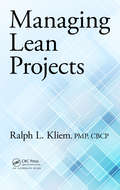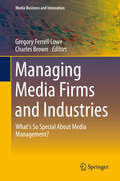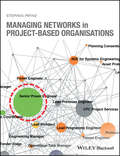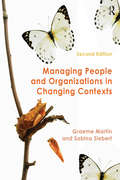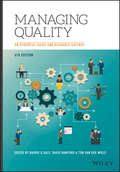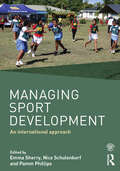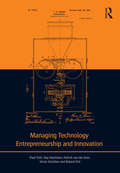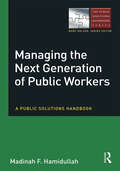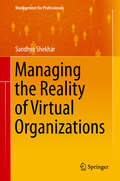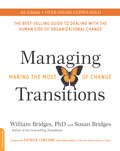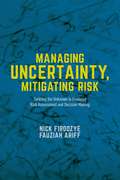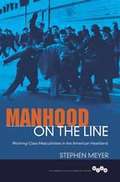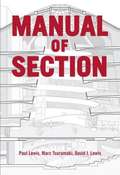- Table View
- List View
Managing Lean Projects
by Ralph L. KliemLean is a set of disciplines that can result in tremendous savings and profitability for companies. It can significantly reduce cycle times and increase customer satisfaction. Lean, however, must be applied efficiently and effectively to achieve optimum results. This book discusses project management concepts, tools, and techniques as they apply to
Managing Media Firms and Industries
by Gregory Ferrell Lowe Charles BrownThis volume provides rich insight into the nature and practice of media management. Contributions assess the degree to which management of media firms requires a unique set of skills, highlighting similarities and differences of media firms compared with other industries in terms of management practices, HR development and operational aspects. Success and limitations of research on media management theory is evaluated, both drawing on management theory and examining insights from other disciplines. Dimensions for future research are considered along with practical implications for media managers and corporate structures. The book serves as a valuable reference for researchers, advanced students and practitioners in media industries.
Managing Networks in Project-Based Organisations
by Stephen PrykeThe first book demonstrating how to apply the principles of social network analysis to managing complex projects This groundbreaking book gets project managers and students up to speed on state-of-the-art applications of social network analysis (SNA) for observing, analysing, and managing complex projects. Written by an expert at the leading edge of the SNA project management movement, it clearly demonstrates how the principles of social network analysis can be used to provide a smarter, more efficient, holistic approach to managing complex projects. Project managers, especially those tasked with managing large, complex construction and engineering projects, traditionally have relied upon analysis and decision-making based upon hierarchical structures and vaguely defined project systems, much of which is borrowed from historic scientific management approaches. However, it has become apparent that a more sophisticated methodology is required for observing project systems and managing relationships with today’s more knowledgeable and demanding clients. Social network analysis (SNA) provides just such an approach. Unfortunately, existing books on social network analysis are written primarily for sociologists and mathematicians, with little or no regard for the needs of project managers — until now. The first and only book of its kind, Managing Networks in Project-Based Organisations: Offers a framework and a fully-developed approach to applying SNA theory and methodologies to large, complex projects Describes highly effective strategies and techniques for managing the iterative and transient relationships between network-defining actor roles involved in the delivery of complex projects Uses numerous real-world examples and case studies of successful applications of SNA to large-scale construction and engineering projects around the world Draws on its author’s decades of experience managing complex projects for demanding clients, as well as his extensive academic research in Project Management Managing Networks in Project-Based Organisations is an important working resource for project management professionals and consultants, especially those serving the construction and engineering industries. It is also an excellent text/reference for postgraduate students of project management and supply chain management, as well as academic researchers of project management.
Managing Our Natural Resources
by William G. Camp Betty Heath-Camp Al D. StokesExplore the world's natural resources and the ways professionals manage them with MANAGING OUR NATURAL RESOURCES, 6th Edition! An introduction to agricultural issues and careers, this book examines a broad variety of topics from forest fires and fishery management to water purification and energy conservation. Organized into an eight-unit overview, chapters cover the must-know fundamentals of land, water, and air, forestry, fish and wildlife, and energy and mineral resources, along with the problems impacting them today. Full-color photographs, illustrations, and case studies add depth and clarity to every chapter, while appendices urge you beyond the book to websites, certification programs, and additional learning opportunities that help you develop critical thinking skills. Now available in an eBook with highlighting and search capabilities, MANAGING OUR NATURAL RESOURCES, 6th Edition invites you to dig in and uncover today's opportunities in the agricultural sciences.
Managing Our Natural Resources
by William G. Camp Betty Heath-CampExplore the worlds natural resources and the ways professionals manage them with MANAGING OUR NATURAL RESOURCES, 6th Edition! An introduction to agricultural issues and careers, this book examines a broad variety of topics from forest fires and fishery management to water purification and energy conservation. Organized into an eight-unit overview, chapters cover the must-know fundamentals of land, water, and air, forestry, fish and wildlife, and energy and mineral resources, along with the problems impacting them today. Full-color photographs, illustrations, and case studies add depth and clarity to every chapter, while appendices urge you beyond the book to websites, certification programs, and additional learning opportunities that help you develop critical thinking skills. Now available in an eBook with highlighting and search capabilities, MANAGING OUR NATURAL RESOURCES, 6th Edition invites you to dig in and uncover todays opportunities in the agricultural sciences.
Managing Our Natural Resources
by William G. Camp Betty Heath-CampExplore the world's natural resources and the ways professionals manage them with MANAGING OUR NATURAL RESOURCES, 6th Edition! An introduction to agricultural issues and careers, this book examines a broad variety of topics from forest fires and fishery management to water purification and energy conservation. Organized into an eight-unit overview, chapters cover the must-know fundamentals of land, water, and air, forestry, fish and wildlife, and energy and mineral resources, along with the problems impacting them today. Full-color photographs, illustrations, and case studies add depth and clarity to every chapter, while appendices urge you beyond the book to websites, certification programs, and additional learning opportunities that help you develop critical thinking skills. Now available in an eBook with highlighting and search capabilities, MANAGING OUR NATURAL RESOURCES, 6th Edition invites you to dig in and uncover today's opportunities in the agricultural sciences.
Managing People and Organizations in Changing Contexts
by Graeme Martin Sabina SiebertManaging People and Organizations in Changing Contexts addresses the contemporary problems faced by managers in dealing with people, organizations and change in a theoretically-informed and practical way. This textbook approaches people management from the perspective of practising and aspiring managers, making it a valuable alternative to existing texts on organizational behaviour and human resource management. This new edition considers new emerging organizational forms such as e-lancing and recent management concerns such as employee engagement, de-professionalization and the growing challenges of social media. Built around a chapter framework that connects different themes to managerial action and practices, this textbook covers a wide range of topics including: managing at the individual, group and organizational levels change management managing creativity and innovation, and corporate governance and corporate social responsibility. There is an increased international flavour, reflected in the range of contemporary case studies and literature used throughout, which explore business and management problems in the private and public sectors. This text will be relevant to practising and aspiring managers studying people management, organizational behaviour and change management.
Managing Quality: An Essential Guide and Resource Gateway
by Ton van der Wiele Barrie G. Dale David BamfordAn essential quality management resource for students and practitioners alike--now in its sixth edition This popular and highly successful text on Quality Management has been fully revised and updated to reflect recent developments in the field. New to the Sixth Edition is timely coverage of agile development, emerging markets, product research, evidence based decision-making, and quality control. Some of the material has been re-ordered and changes to terminology have been made to bring the book completely up to date. Contributions from new co-author David Bamford offer insights from a veteran teacher and practitioner. A popular resource for students, academics, and business practitioners alike Combines the latest information on quality management system series standards with up-to-date tools, techniques and quality systems Includes insights on quality, operations management, and strategic process improvement Highly relevant for professionals, particularly those involved with reacting to rapid developments in the global market The word "quality" has many definitions, dependent on context and situation. It is often over-used but always in-demand, and it can make or break a business. Quality management is becoming an increasingly vital factor in the success of a product or service, and it requires constant attention and a continuous drive to do better. Managing Quality is a comprehensive resource that helps you ensure - and sustain - high quality standards.
Managing Reputation in The Banking Industry
by Stefano Dell'Atti Annarita TrottaThe topic of reputational crisis in the banking sector has receivedincreasing attention from academics and practitioners. This book presentsexpert contributions that cover three main aspects: first, an extensive reviewof the literature on reputational risk in the banking sector aimed to identifythe relationships between causes, effects, stakeholders, and keyqualitative-quantitative variables involved during the reputational crisis of abank; second, devising a conceptual framework for management of reputational crisisin banking, and finally, testing this framework with the results of anempirical analysis carried out by observing key variables of some known casesof reputational crisis relating to international banks and proposing casestudies regarding the dynamic process of reputation management.
Managing Sport Development: An international approach
by Nico Schulenkorf Emma Sherry Pamm PhillipsSport development has become a significant part of the international sport industry. The development of sport (creating pathways for participation and talent development) and sport for development (using sport as a tool to achieve outcomes beyond sport) are now fundamental aspects of the organisation and governance of sport around the world. Consequently, any manager working in sport today needs to understand what sport development is and how sport development programs can be managed, implemented and evaluated. This is the first undergraduate textbook to offer a complete introduction to sport development, covering theory and its application to managerial practice, with examples from international contexts. The book integrates discussion of the development of sport and sport for development in every chapter, with international case studies to illustrate the significance and application of both. Each chapter introduces key theory, examines the implications of theory for practice and critically analyses practical managerial issues. Discussion of both able-bodied and disability sport are embedded throughout, and the book includes a range of useful features to aid understanding, such as learning objectives, real world data and examples, key terms, review questions, and a companion website containing slides and a test bank for instructors. Managing Sport Development is an essential text for any introductory sport development course, and invaluable reading for any course on international sport management, sport policy, sport governance, sport and social issues, or coach education.
Managing Technology Entrepreneurship and Innovation
by J. Roland Ortt Paul Trott Dap Hartmann Patrick van der Duin Victor ScholtenManaging Technology Entrepreneurship and Innovation is the first textbook for non-business based entrepreneurship courses, focussed on students with a background in science and technology. Its comprehensive, rigorous and yet accessible approach originates from the authors’ considerable experience mentoring students as they turn their technological ideas into real-life business ventures. . The text is separated into three parts providing a roadmap for successful entrepreneurial projects: Part I focusses on how to create your venture, turning technology into businesses and how to link together entrepreneurship and innovation Part II shows you how to grow your venture and make it profitable, looking at the early development of academic spin-outs and how to adapt your technology to the customers’ needs. Part III takes you through the day-to-day running on your business; whether to adopt a contingency or contextual approach, how to develop new products and services and alternative options for growth. With a wide range of practical steps, lists of things to consider and guidelines on how to turn your technology based ideas into a successful business, this text will be essential for all non-business students who need to understand entrepreneurship, management and innovation. It will also prove a useful introduction to all Masters-level students taking these subjects in business schools.
Managing the European Refugee Crisis
by Elena Corsi Gunnar Trumbull Daniela BeyersdorferIn 2016, Europe struggles to cope with one of the largest refugee flows it has ever witnessed.
Managing the Millennials: Discover the Core Competencies for Managing Today's Workforce
by Chip Espinoza Mick UklejaThe Builders, Baby Boomers, Generation X, and Millennials—all make up workforces in every type of industry all over the world. The generational gaps are numerous and distinctly different between each age group, and Millennials have gotten a reputation for being particularly unique and often challenging. In this updated and expanded Second Edition of the popular guidebook Managing the Millennials, you'll see how Millennial traits are the same around the globe. In fact, Millennials are more alike than any other generation before them due in large part to rapid advances in technology that let us share more experiences together. These same rapid advances are also redefining the fundamental ways businesses operate, and this revised edition includes the international perspective today's valuable leadership needs to attract and retain these high-performing workers with very different values and expectations. With fresh research and new real-world examples, the powerhouse authorial team reexamines the differences between how different generations work today in businesses around the world, with insightful exploration into what makes the Millennial generation so different from the ones that came before. The authors reveal nine specific points of tension commonly arising from clashing value systems among generations and prescribe nine proven solutions to resolve conflict and build communication, nurture collaborative teams, and create long-lasting relationships among colleagues of every age. A wealth of informative tables and convenient end-of-chapter summaries make this an invaluable everyday reference to support you: Making the most informed decisions with up-to-date, research-based guidance on getting the most from twenty-something employees Executing solutions to the most common obstacles to younger workers engaging and learning from the people who manage them Enhancing your skills as a job coach with practical tips and hands-on tools for coaching Millennials, including concrete action steps for overcoming roadblocks Complete with case studies of real managers and employees interacting in every area of business, enlightening analysis of performance and behavioral patterns across generations, and easy-to-use techniques you can use right away to improve your organization, Managing the Millennials, Second Edition gives you everything you need to inspire your entire workforce to new levels of productivity.
Managing the Next Generation of Public Workers: A Public Solutions Handbook (The Public Solutions Handbook Series)
by Madinah F HamidullahManaging the Next Generation of Public Workers is a fresh and energetic look at the changing climate of diversity in the public and nonprofit workplace. The workforce of the twenty-first century represents unparalleled complexity: Baby Boomers, GenX, GenY, and Millennials. Although that diversity may be challenging and often overwhelming for public managers, Madinah Hamidullah emphasizes the potential strengths that can be drawn from complex multigenerational relationships. This handbook offers public and nonprofit managers the tools necessary to address generational differences and questions such as: • How do the newer generations in the workplace differ on such fundamentals as work ethic, family values, and retirement horizons? • Are they recruited differently and do they expect a different mix of benefits—perhaps a better work-life balance as a tradeoff for a lower salary? • How can diverse, generational perspectives in the workplace add value by questioning old, traditional assumptions? • Will approaches to organizational decision making necessarily change as new generations take over? The book is for public and nonprofit managers who recognize the challenges of managing a multigenerational workforce, and are therefore seeking helpful insights. This volume is a roadmap not only for human resource (HR) managers, but for all managers who must address the complexities of the human condition—complexities that are complicated by the most rapid succession of workforce generations that we have yet seen.
Managing the Reality of Virtual Organizations
by Sandhya ShekharThis book comes at a time when virtual organizations(VO), are proliferating exponentially due to the twin catalysts ofglobalization and technological enablement. It provides conceptual frameworksand simple tools for identifying and addressing the complexities of managinggeographically dispersed, virtually linked organizations, which may have grownorganically or inorganically into a potpourri of multiple cultures,capabilities and practices. These can help to scientifically assess the impactof virtualization, balance the physical with the virtual and manage risks usingearly indicators. The book provides mechanisms to recognize, localize, measureand address vulnerabilities. Ensuring knowledge transfer effectiveness (KTE) isvital in VOs. A diagnostic tool has been evolved to measure KTE, isolateproblems and weak links and plan effective interventions. A set of criticalfactors to increase the probability of success of globalization strategies havebeen identified. This book interleaves theory with practice and providesinsights drawn from conversations with business leaders, exploratory surveys,and in-depth research using a large sample. The solid methodologicalunderpinnings serve as a useful template for researchers, while the models canbe contextualized to suit any organization. Foreword by Mr. Ajit Balakrishnan, Chairman and CEO, Rediff. com;Chairman, Board of Governors, Indian Institute of Management Calcutta.
Managing the Transition to a Low-Carbon Economy: Perspectives, Policies, and Practices from Asia
by Masahiro Kawai Bindu N. Lohani Venkatachalam AnbumozhiAsia must be at the center of the global fight against climate change. It is the world's most populous region, with high economic growth, a rising share of global greenhouse gas emissions, and the most vulnerability to climate risks. Its current resource- and emission-intensive growth pattern is not sustainable. This study recognizes low-carbon green growth as an imperative-not an option-for developing Asia.Asia has already started to move toward low-carbon green growth. Many emerging economies have started to use sustainable development to bring competitiveness to their industries and to serve growing green technology markets.The aim of this study is to share the experiences of emerging Asian economies and the lessons learned. The book assesses the low-carbon and green policies and practices taken by Asian countries, identifies gaps, and examines new opportunities for low-carbon green growth.
Managing Transitions, 25th anniversary edition: Making the Most of Change
by William Bridges Susan BridgesThe business world is constantly transforming. When restructures, mergers, bankruptcies, and layoffs hit the workplace, employees and managers naturally find the resulting situational shifts to be challenging. But the psychological transitions that accompany them are even more stressful. Organizational transitions affect people; it is always people, rather than a company, who have to embrace a new situation and carry out the corresponding change. As veteran business consultant William Bridges explains, transition is successful when employees have a purpose, a plan, and a part to play. This indispensable guide is now updated to reflect the challenges of today's ever-changing, always-on, and globally connected workplaces. Directed at managers on all rungs of the corporate ladder, this expanded edition of the classic bestseller provides practical, step-by-step strategies for minimizing disruptions and navigating uncertain times.
Managing Uncertainty, Mitigating Risk: Tackling the Unknown in Financial Risk Assessment and Decision Making (Global Financial Markets)
by Fauziah Ariff Nick FiroozyeManaging Uncertainty, Mitigating Risk proposes that financial risk management broaden its approach, maintaining quantification where possible, but incorporating uncertainty. The author shows that by using broad quantification techniques, and using reason as the guiding principle, practitioners can see a more holistic and complete picture.
Managing Your Boss In A Week: Managing Up In Seven Simple Steps (Teach Yourself In A Week Ser.)
by Sandi MannManaging your boss just got easierHaving a good working relationship with the person in charge is crucial to enjoying a positive and fulfilling work life. All of the problems created by difficult relationships can be avoided, in many cases, by simply learning the skills to successfully 'manage' your boss. Most of us think that it is the other way around - that the boss manages us - but the astute employee knows that it works both ways.If you understand how your boss operates, the inner working of their brain and their personality, you are far better able to meet their needs as an employee. And an employee who meets the needs and expectations of their boss will be a popular employee indeed!This book guides you through the process of managing your boss so as to ensure that you are ideally placed to become their favourite employee. Whether you choose to read it in a week or in a single sitting, this is your fastest route to success:- Sunday: What kind of animal is the 'boss'?- Monday: What type of boss do you have?- Tuesday: Using the psychological contract to manage your boss- Wednesday: How to impress your boss- Thursday: Getting more from your boss- Friday: Dealing with the boss from hell- Saturday: Common problems with managing the boss
Managing Your Personal Finances
by Joan S. Ryan Christie RyanWhile focusing on the student's role as citizen, student, family member, consumer, and active participant in the business world, MANAGING YOUR PERSONAL FINANCES 7E informs students of their various financial responsibilities. This comprehensive text provides opportunities for self-awareness, expression, and satisfaction in a highly technical and competitive society. Students discover new ways to maximize their earning potential, develop strategies for managing their resources, explore skills for the wise use of credit, and gain insight into the different ways of investing money. Written specifically for high school students, special sections in each chapter hold student interest by focusing on current trends and issues consumers face in the marketplace.
Managing Your Personal Finances
by Joan Ryan Christie RyanWhile focusing on the student's role as citizen, student, family member, consumer, and active participant in the business world, MANAGING YOUR PERSONAL FINANCES 7E informs students of their various financial responsibilities. This comprehensive text provides opportunities for self-awareness, expression, and satisfaction in a highly technical and competitive society. Students discover new ways to maximize their earning potential, develop strategies for managing their resources, explore skills for the wise use of credit, and gain insight into the different ways of investing money. Written specifically for high school students, special sections in each chapter hold student interest by focusing on current trends and issues consumers face in the marketplace.
Managing Yourself In A Week: The Success Toolkit For Managers In Seven Simple Steps
by Martin ManserManaging yourself just got easierOne of the most important aspects of being a manager is being able to manage yourself and the first step to doing this effectively is becoming aware of yourself and evaluating your strengths and weaknesses. In Managing Yourself In A Week you will learn about good time management and organization skills including planning and setting priorities, dealing with time wasters, and practical steps on maintaining a diary and to-do lists. You will explore techniques such as managing your mind and learn about the power of positive thinking in developing strategies and making good decisions. You will learn about managing emotions, increasing confidence, dealing with nerves, motivating yourself and building strong relationships by applying good listening skills. The final chapter, on managing stress, looks at what produces stress in you and discusses ways of dealing with its consequences. Managing Yourself in a Week gives handy guidelines that will enable you to take a grip on yourself and re-evaluate your way of working and your priorities in life. It is a quick and reliable guide to the basics of self-management in the world of work.Over this week-long course you will cover:- Sunday: Know yourself well- Monday: Manage your focus clearly- Tuesday: Manage your time effectively- Wednesday: Manage your mind decisively- Thursday: Manage your emotions carefully - Friday: Manage your relationships successfully- Saturday: Manage stress thoroughly
Manhood on the Line: Working-Class Masculinities in the American Heartland (The Working Class in American History)
by Stephen MeyerStephen Meyer charts the complex vagaries of men reinventing manhood in twentieth century America. Their ideas of masculinity destroyed by principles of mass production, workers created a white-dominated culture that defended its turf against other racial groups and revived a crude, hypersexualized treatment of women that went far beyond the shop floor. At the same time, they recast unionization battles as manly struggles against a system killing their very selves. Drawing on a wealth of archival material, Meyer recreates a social milieu in stunning detail--the mean labor and stolen pleasures, the battles on the street and in the soul, and a masculinity that expressed itself in violence and sexism but also as a wellspring of the fortitude necessary to maintain one's dignity while doing hard work in hard world.
Manual of Section
by David J. Lewis Paul Lewis Marc TsurumakiAlong with plan and elevation, section is one of the essential representational techniques of architectural design; among architects and educators, debates about a project's section are common and often intense. Until now, however, there has been no framework to describe or evaluate it. Manual of Section fills this void.Paul Lewis, Marc Tsurumaki, and David J. Lewis have developed seven categories of section, revealed in structures ranging from simple one-story buildings to complex structures featuring stacked forms, fantastical shapes, internal holes, inclines, sheared planes, nested forms, or combinations thereof. To illustrate these categories, the authors construct sixty-three intricately detailed cross-section perspective drawings of built projects--many of the most significant structures in international architecture from the last one hundred years--based on extensive archival research. Manual of Section also includes smart and accessible essays on the history and uses of section.
